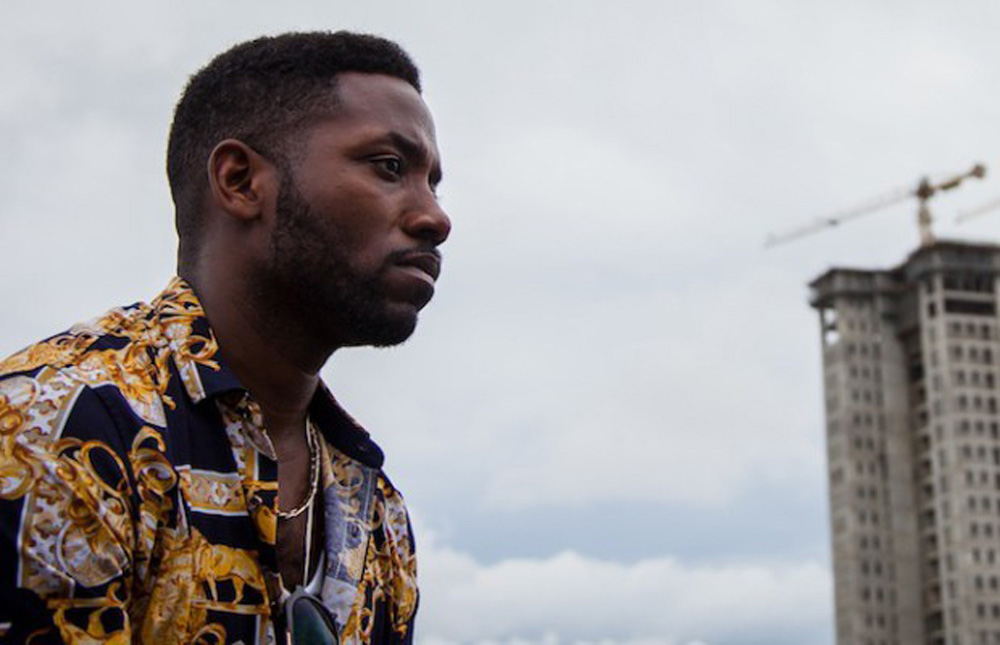After honing the script for “Nigerian Prince” for a couple years, Faraday Okoro and his producing partner Oscar Hernandez were looking into financing when they received an e-mail from the Tribeca Film Institute that appeared to be too good to be true.
“When this Untold Stories initiative came up, it [appeared like it] was a little bit like a scam e-mail at first,” laughed Hernandez, who knew of such things since a get rich quick scheme was at the heart of the plot of “Nigerian Prince.” “This was a new initiative at the time and they said, “We’re basically giving one person a million bucks to go make a movie. Would you like to be considered?”
Had it not been Tribeca, the two might’ve filed the e-mail away to their junk folder as they have so many others that have promised a small fortune if only they’d submit some personal information, but it’s a good thing they didn’t since just a little over a year later they found themselves in New York for the premiere of “Nigerian Prince.” Okoro’s splendid directorial debut isn’t just an introduction to an exciting new filmmaker, but an equally promising start to Tribeca and AT&T’s Untold Stories initiative that proves when you elevate voices that have been traditionally underrepresented, you’re likely giving audiences something entirely new. That’s certainly true in the case of “Nigerian Prince,” a particularly refreshing thriller set on the streets of Lagos where a smooth criminal named Pius (Chinaza Uche) is constantly on the make, setting up schemes selling cars he doesn’t own and sneaking into computer cafes to pen those infamous e-mails to unsuspecting foreigners asking for money with the promise of more to come back to them.
Okoro splits the focus between Pius and one such aloof American — but not a target of his cons — when he trains the lens on Eze (Antonio J. Bell), a city kid whose mother wants to him get in touch with his Nigerian roots after being involved in a fight back home, sending him to live with his Auntie Grace (Tina Mba), Pius’ mother. While Pius has run out of easy marks to hustle in Lagos, Eze is eager to find a way back to America and as the two plot ways to expand the map for one another, Okoro does the same for audiences, allowing one to become immersed in the cultural richness of Nigeria where income inequality has given way to ingenuity and resourcefulness in all facets of life, as well as understanding why Pius has had to use his wits for illicit activities. The script from Okoro and Andrew Long is every bit as wily as the fast-on-their-feet characters and despite filming on an exceedingly tight schedule in a country where blackouts weren’t uncommon, “Nigerian Prince” throws off plenty of sparks. The morning after the film premiered at the Tribeca Film Festival, a year to the day it was first greenlit for production, Okoro, Hernandez and Bose Oshin, a well-experienced producer in Nigeria who made sure the cross-continental production worked in harmony, spoke about how they pulled off such a crazy feat of their own with the wildly entertaining thriller, which is now arriving in theaters and on demand.
How did the story for this come about?
Faraday Okoro: I had this idea back when I was a college senior. I was actually in my university’s computer lab and it just hit me all at once – I should make a film about Nigerian e-mail scammers. I sat on it for a little bit because I thought maybe it’s a bigger film than I was capable of, but as the years had gone by, I realized film is not meant to be easy. And then I mustered up the courage and began writing the script.
How do you build a team for this when some are Americans and some are Nigerians?
Oscar Hernandez: Faraday and I were in the same class in NYU’s grad film [program] and we became friends pretty early on. I produced a short film for him and [during our] last year at NYU, he said, “Let’s meet up. I want to talk about making a feature.” I get those e-mails all the time from classmates and friends, and Faraday is very much a “This is what I’m going to do and it’s going to happen”-type, so I’m like, “Well, that’s interesting because he’s not like these other people.” I met with Faraday and I honestly thought I would tell him I couldn’t commit without a script, but he pitched me the concept/premise about Nigerian e-mail scamming through the point of view of a Nigerian-American teenager, and it would be [filmed] in Nigeria. I actually thought that’s a pretty high-concept premise and I knew he was really serious and he was drawing a lot on his personal story, so it’d be authentic and I was like, “Yeah, I’ll do it.”
This film shows off so much of Lagos. Was it a goal to include as many locations as you could for that reason?
Faraday Okoro: Yeah, it was to an extent. I didn’t want it to seem like a touristy depiction of it, but just [experience it] like a character who lives there and he’s going to spots that he frequents like the club or with Grace taking him to the market. In Nigeria, and Lagos in particular, especially where we shot [on] Victoria Island, it’s such a beautiful place and we shot on the mainland, so wherever you point the camera, it just speaks volumes, especially for those of us who have not been there. For instance, [Grace’s] home with the walls being those [bold] colors just pops, so Nigeria speaks for itself.
For Bose, what’s it like to get this script and then have to figure out how to get all these locations?
Faraday Okoro: The flip side. [laughs]
Oscar Hernandez: Faraday reached out to Biyi Bandele, who has done a number of films in Nigeria himself, via Facebook and Biyi actually responded to him and we decided we’d actually include him as part of the producing team [as an executive producer], and he introduced us to Bose Oshin, an accomplished producer in Nigeria, and Boze really shepherded the production process there.
Bose Oshin: I usually work with the mindset that nothing is impossible. Everything is achievable once you put your mind to it, so getting the script and seeing the locations, I’m like okay, it’ll be a challenge, but it definitely can be done. The locations were a bit of a challenge, a bit more expensive than we thought, but at the end of the day, it worked out quite well.
It looked like you shot at an operational airport.
Bose Oshin: Yes, it was an operational airport. We had to shoot through the night because there are no late flights, so you had to shoot into the early hours of the morning over two days, so it was quite an adventure.
Oscar Hernandez: Yeah, Faraday was having to move very fast those days. But we got it done.
Faraday Okoro: That was the project in general, but for us, the films we normally work on, it’s low budget stuff, so we’re familiar with working quickly, efficiently and effectively, and we just applied a lot of those skills to this project.
I understand there were both Nollywood crews and American crews working on this. What was it like bringing the style of those two crews together?
Faraday Okoro: That made for an effective, well-told film because the Nigerian cast and crew were able to give us certain suggestions like, “This character would say it like this.” For instance, I remember when Pius is talking to his mother and she says something along the lines of “The way you scammed me, I won’t let you scam him like that,” and [Grace] said, ““The evil that you did to me I won’t allow you to do it to him,” and when she said “evil,” I’m [thinking], “That’s perfect. I see this character saying that” because that’s the way she views it.
Oscar Hernandez: We felt a lot of warmth and generosity from the Nigerian cast and crew. They were so happy to be working on this film and they were so happy about the way it was being run and managed.
Bose Oshin: For this, we had some of the best crew in Nigeria and for me, crewing a production is always for me, “Okay, what is a story about” – it helps inform who I choose as my team to work with and we all worked in synergy. Everyone was professional, everything went just as it should be and it was fantastic.
Oscar Hernandez: The work styles combined very well because we do have different ways of working, but at the end of the day, you’re trying to get a movie done, so that was the general understanding. Everybody knew you better be on time. That was the main thing. We housed local crew right where we were so we could leave together on location buses every day. We only had so much money and so much time and AT&T was going to be waiting for a rough cut in December, so we just knew we really got to do it and they did too.
When you can’t be precious with things, is there anything that you weren’t anticipating, but it’s in the film and it’s something you like about it?
Faraday Okoro: Yeah, you have a script and you’re not quite sure at times whether it’s too elaborate or too detailed, but you put it there anyway because you’re like, “Why not? This is a script.” And then when you get on set and the sun starts setting, you’re [think], “Okay, this has to be condensed, what can you lose and what can we keep?” And you get rid of a lot of the fat and in effect sometimes make it more cinematic, letting your images tell your story as opposed to dialogue. That happened on a few occasions and though we had a lot of locations, we were very crafty in the way we oriented the production. We made sure a lot of our locations were places that we could get to quickly from our hotel because traffic in Nigeria is really bad.
Oscar Hernandez: Worse than L.A.
Faraday Okoro: And we knew we couldn’t do a lot of company moves, so we were able to modify certain locations right next to each other and you’d never know watching it. And we shot during the tail-end of the rainy season, [which] is something we have nothing like in the States. A lot of times the rain here, you can just shoot and pass it for day with the color correction. It flooded there and you just can’t shoot if it’s a flood [when] you shot there prior and the ground was bone dry, so that and traffic were major hurdles for us, but we planned accordingly and again, we worked with talented individuals to make sure we could do it.
How did you find your wonderful leads for the film?
Faraday Okoro: Right after I locked the script, I began scouring locally for a person to play Pius because though I knew I would be shooting in Nigeria, I wanted to give [the actor playing him] the script immediately, being able to flesh it out because I knew I would need an actor to really dig deep. I just asked friends [about] Nigerian talent in New York, or L.A. for that matter and everyone told me to check out this play called “Sojourners.” In fact, it was going to be playing two days [away], so I bought tickets immediately and I saw Pius – the character in the play was Nigerian in Nigeria, so he was doing the accent and immediately I knew Chinaza [Uche] was the guy. He was also going to do another play in Seattle, so we Skyped, he read the script, and he loved it. He never had the opportunity to play a main character, especially a Nigerian character on film, so he saw it as being meant for him.
For the Eze character, we worked with Avy Kaufman, a brilliant, lovely casting director, and she searched the States for a person of that age. Antonio sent us an audition [tape] and it was between him and another person, but we did a callback and we knew it was him. Just to make sure, he came from Georgia, where he’s from, to do a table reading and met [Chinaza] to really see if they had that chemistry and they did.
At the premiere, Antonio spoke about looking into his own family tree and Chinaza spent a week before the shoot in Nigeria visiting with relatives – were those things you were encouraging or was that of their own initiative?
Faraday Okoro: It’s 50/50, but I know that they see the way that we work. We’re very thorough and methodical, so they knew, “Okay, this is that type of production.” For the Pius character, Chinaza and I talked [about how] he had to be there a week in advance at least, just to dive into the character and he did. He just came to the hotel for one little bit and then he was off, just hanging out with his cousin, going to bars, going to markets, talking with people. And it was the opposite for Antonio [by design]. We wanted him to be that fish out of water, so we wanted him to come there and immediately start working, so he can encapsulate that whole, “wow, this is all new. This is an alien landscape because I’m coming from the West.”
The score for the film is also really great, keeping the film at a low boil as a thriller until it finally spills over and incorporating a regional sound. How did that come about?
Faraday Okoro: We worked with two great composers, Peter Nashel and Eric Hachikian, and they knew they didn’t want to do something cliche. It needed to have like a West African/Nigerian them running through it and they dug deep to make sure it’s something that fit, but nothing that was too over the top. They wanted it to be subtle but clue you in that it’s a thriller and to have the music suddenly amplify scenes and it did.
Oscar Hernandez: It buttressed all of the character arcs. It made such a huge difference from the rough cut when we didn’t have a score to the final cut. Peter Nashel’s a big composer, and he really studied not just traditional Nigerian music, but also more experimental, contemporary Nigerian music and it was really interesting to sit with him and go through ideas and brainstorm, talk about references. We’re really happy with the music.
What was it like to make it to the premiere, especially when it was such a tight deadline from last year to this year?
Faraday Okoro: It was lovely. Again, deadlines aren’t a thing with me. And the reception – we sold out our first four screenings within the first hour that tickets were released and then they added an encore and that sold out, so I knew there was going to be a lot of love and support. To see people in the theater watching it for the first time, including the actors, it’s a dream come true.
Oscar Hernandez: Tribeca and AT&T were definitely worried about us making the deadline for the festival. Faraday didn’t really know this, but they were [asking], “You think we should push for a work-in-progress screening instead?” And I was like, “No, we’re going to be fine.” Amy Hobby, the executive director at the [Tribeca Film] Institute, was like, “Can you and I go meet with Final Frame” — a very generous post house here in New York — “so we could see really what this timeline is going to be like?” And once we sat with Final Frame, everything seemed to look good to them as well, because they had seen some of our material, so they’re like, “We’re pretty confident as long as these guys aren’t unreasonable about wanting to change things last minute.” We didn’t have to make major overhaul changes. And Faraday’s amazing, especially in sound sessions, so the only changes that really needed to happen were super little detailed things, and the deadline wasn’t a problem.
And Olga and Fiona and Amy Hobby and Jane Rosenthal all agreed with me that we have to fly out Boze [out] for the premiere because she’s the only woman in the core team, and we didn’t choose her because she’s a woman, we chose her because she’s the best producer in Nigeria and happens to be a woman, but that’s so in alignment with the whole mission of what Jane and Amy have set out for Tribeca’s goal to support women and underrepresented filmmakers with [“Untold Stories”], so they were very generous in bringing Boze out and having her come party with us.
Bose, what’s the big premiere in New York like for you?
Bose Oshin: Fantastic. It’s like I’m Cinderella at the ball. I loved it. It blew me away and I’ve certainly loved every moment of it.
“Nigerian Prince” opens on October 19th in Los Angeles at the Laemmle Monica Film Center and in New York at the AMC Empire. It will also now available on demand and on DirecTV and U-Verse.




